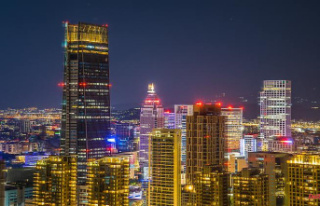Russia and Turkey are moving closer together economically. Turkish President Erdogan is positioning himself against the West. His main concern is to be re-elected next year.
Closer economic cooperation between Russia and Turkey, announced by Vladimir Putin and Recep Tayyip Erdogan, is progressing. Both presidents met in Sochi, Russia, at the end of last week. According to the financial news agency "Bloomberg", five Turkish banks have now started to introduce the Russian payment system "Mir" (German: "world" and "peace").
This does not mean that the banks will only use the Russian system in the future. Instead, they enable Russians to transfer money, pay by credit card and use ATMs in Turkey, for example. The background: Russian banks are largely excluded from the Swift international payment system because of Western sanctions.
NATO member Turkey is once again opposing the West. The government criticizes the Russian war of aggression in Ukraine, but does not agree with the sanctions imposed by the USA, Great Britain and the EU.
With the use of the Russian payment system, Turkey is likely to want to support, among other things, tourism, which is important for it. The Turkish tourism industry, hit by the lack of visitors due to the corona pandemic in the past two years, had hoped for a strong recovery this year. Most foreign tourists come from Russia - last year around 4.7 million Russians came to Turkey. Germany followed with around 3 million tourists, ahead of Ukraine with around 2 million visitors.
However, the attack on Ukraine means that fewer tourists from Russia come to Turkey than predicted. Instead of the seven million Russian tourists forecast at the beginning of the year, only three million are now expected, said Mehmet Isler, deputy chairman of the Turkish Hotel Association (Türofed) in May.
Turkey is in a deep economic crisis and is suffering from high inflation. Presidential and parliamentary elections are due in Turkey in nine months. Erdogan wants to be re-elected, is fighting for his political survival and is therefore dependent on economic success stories.
Against this background, the announcement that Turkey will - as demanded by the Kremlin - pay part of the energy supplies from Russia in rubles in future should also be seen. The country relies not only on Russian tourists, but also on imports of grain and energy. Last year, Turkey bought about a quarter of the crude oil it needs and about 45 percent of the natural gas it needs from Russia.
Experts are assuming a close race with the opposition in the upcoming presidential election. For almost 20 years, Erdogan stayed in power with his conservative Islamic governing party, the AKP - but above all the rampant currency crisis, inflation and unemployment have damaged his popularity with the population.












